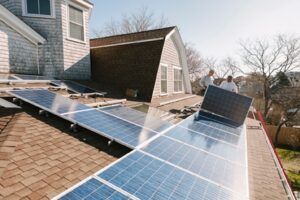Rethinking bulb types
As compact fluorescent light bulbs increase in popularity, their environmental impact — namely the mercury released when the rarely recycled bulbs are dumped in a landfill — has some rethinking the old-fashioned incandescents.
“They give off a very pleasing light,” says Virginia Cartwright, associate professor of architecture and the director of the University of Oregon’s Baker Lighting Lab of these classic bulbs. Cartwright suggests creating a good “luminous environment” in the home, where a mixture of light wood and painted surfaces along bright décor can take some of the heavy lifting off of less-efficient bulbs.
Mixing bulb types based on lighting needs also makes sense: incandescents do well for task lighting while fluorescents are more practical for large interior spaces. While considering the pros and cons of the various bulbs on the market, don’t underestimate the value of uncovered windows welcoming the light of the brightest bulb there out there. Let the sun shine in!
Household items that take the place of toxic alternatives:
Cleanvia is a cult favorite green cleaning solution made in Oregon that actually cleans. Made from seed oil from non-GMO plants such as oats, Cleanvia works by lifting dirt off the surface of the product without being abrasive. Low sudsing action also requires less water and product to get things spic-and-span. Cleanvia.com.
The brainchild of an ER doctor who treated a young girl with acid burns caused by drain cleaner splash-back, EverClear works by trapping and disposing clogs without the need for chemicals. $29.95; evercleardrain.com.
Wired iRepair, a new repair clinic in Portland takes hopelessly fractured but beloved iPhones and Blackberries and saves them from the landfill. Fixing rather than pitching otherwise usable phones makes sense when one considers that of the 140 million cell phones discarded each year, only ten percent are recycled. Even with recycling, not all of the metals or components can be reused, creating an enormous waste stream that includes highly toxic elements such as lead and cadmium. Repairs start at $65; wiredirepair.com.





